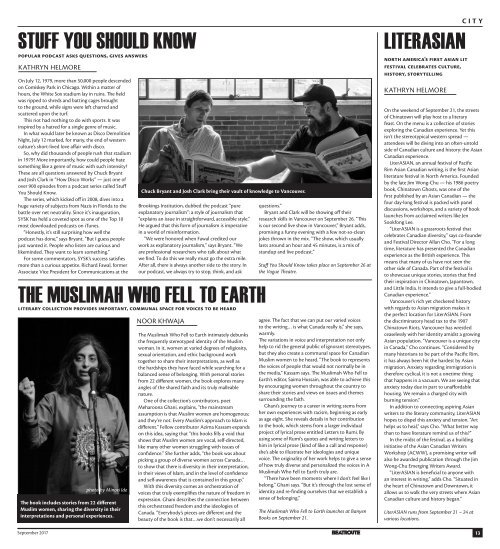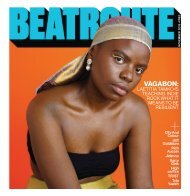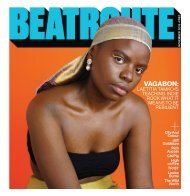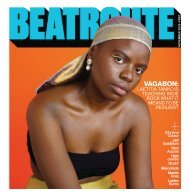Beatroute Magazine BC Print Edition - September 2017
BeatRoute Magazine is a monthly arts and entertainment paper with a predominant focus on music – local, independent or otherwise. The paper started in June 2004 and continues to provide a healthy dose of perversity while exercising rock ‘n’ roll ethics. Currently BeatRoute’s AB edition is distributed in Calgary, Edmonton (by S*A*R*G*E), Banff and Canmore. The BC edition is distributed in Vancouver, Victoria and Nanaimo. BeatRoute (AB) Mission PO 23045 Calgary, AB T2S 3A8 E. editor@beatroute.ca BeatRoute (BC) #202 – 2405 E Hastings Vancouver, BC V5K 1Y8 P. 778-888-1120
BeatRoute Magazine is a monthly arts and entertainment paper with a predominant focus on music – local, independent or otherwise. The paper started in June 2004 and continues to provide a healthy dose of perversity while exercising rock ‘n’ roll ethics.
Currently BeatRoute’s AB edition is distributed in Calgary, Edmonton (by S*A*R*G*E), Banff and Canmore. The BC edition is distributed in Vancouver, Victoria and Nanaimo. BeatRoute (AB) Mission PO 23045 Calgary, AB T2S 3A8 E. editor@beatroute.ca BeatRoute (BC) #202 – 2405 E Hastings Vancouver, BC V5K 1Y8 P. 778-888-1120
Create successful ePaper yourself
Turn your PDF publications into a flip-book with our unique Google optimized e-Paper software.
STUFF YOU SHOULD KNOW<br />
popular podcast asks questions, gives answers<br />
KATHRYN HELMORE<br />
On July 12, 1979, more than 50,000 people descended<br />
on Comiskey Park in Chicago. Within a matter of<br />
hours, the White Sox stadium lay in ruins. The field<br />
was ripped to shreds and batting cages brought<br />
to the ground, while signs were left charred and<br />
scattered upon the turf.<br />
This riot had nothing to do with sports. It was<br />
inspired by a hatred for a single genre of music.<br />
In what would later be known as Disco Demolition<br />
Night, July 12 marked, for many, the end of western<br />
culture’s short-lived love affair with disco.<br />
So, why did thousands of people rush that stadium<br />
in 1979? More importantly, how could people hate<br />
something like a genre of music with such intensity?<br />
These are all questions answered by Chuck Bryant<br />
and Josh Clark in “How Disco Works” — just one of<br />
over 900 episodes from a podcast series called Stuff<br />
You Should Know.<br />
The series, which kicked off in 2008, dives into a<br />
huge variety of subjects from Nazis in Florida to the<br />
battle over net neutrality. Since it’s inauguration,<br />
SYSK has held a coveted spot as one of the Top 10<br />
most downloaded podcasts on iTunes.<br />
“Honestly, it’s still surprising how well the<br />
podcast has done,” says Bryant. “But I guess people<br />
just wanted it. People who listen are curious and<br />
likeminded. They want to learn something.”<br />
For some commentators, SYSK’s success satisfies<br />
more than a curious appetite. Richard Fawal, former<br />
Associate Vice President for Communications at the<br />
Brookings Institution, dubbed the podcast “pure<br />
explanatory journalism”: a style of journalism that<br />
“explains an issue in straightforward, accessible style.”<br />
He argued that this form of journalism is imperative<br />
in a world of misinformation.<br />
“We were honored when Fawal credited our<br />
work as explanatory journalism,” says Bryant. “We<br />
are professional researchers who talk about what<br />
we find. To do this we really must go the extra mile.<br />
After all, there is always another side to the story. In<br />
our podcast, we always try to stop, think, and ask<br />
THE MUSLIMAH WHO FELL TO EARTH<br />
literary collection provides important, communal space for voices to be heard<br />
photo by Minori Ide<br />
The book includes stories from 22 different<br />
Muslim women, sharing the diversity in their<br />
interpretations and personal experiences.<br />
Chuck Bryant and Josh Clark bring their vault of knowledge to Vancouver.<br />
NOOR KHWAJA<br />
The Muslimah Who Fell to Earth intimately debunks<br />
the frequently stereotyped identity of the Muslim<br />
woman. In it, women at varied degrees of religiosity,<br />
sexual orientation, and ethic background work<br />
together to share their interpretations, as well as<br />
the hardships they have faced while searching for a<br />
balanced sense of belonging. With personal stories<br />
from 22 different women, the book explores many<br />
angles of the shared faith and its truly malleable<br />
nature.<br />
One of the collection’s contributors, poet<br />
Meharoona Ghani, explains, “the mainstream<br />
assumption is that Muslim women are homogenous;<br />
and they’re not. Every Muslim’s approach to Islam is<br />
different.” Fellow contributor Azima Kassam expands<br />
on this idea, saying that “this books fills a void that<br />
shows that Muslim women are vocal, self-directed,<br />
like many other women struggling with issues of<br />
confidence.” She further adds, “the book was about<br />
picking a group of diverse women across Canada…<br />
to show that there is diversity in their interpretation,<br />
in their views of Islam, and in the level of confidence<br />
and self-awareness that is contained in this group.”<br />
With this diversity comes an orchestration of<br />
voices that truly exemplifies the nature of freedom in<br />
expression. Ghani describes the connection between<br />
this orchestrated freedom and the ideologies of<br />
Canada. “Everybody’s pieces are different and the<br />
beauty of the book is that…we don’t necessarily all<br />
questions.”<br />
Bryant and Clark will be showing off their<br />
research skills in Vancouver on <strong>September</strong> 26. “This<br />
is our second live show in Vancouver,” Bryant adds,<br />
promising a funny evening with a few not-so-clean<br />
jokes thrown in the mix. “The show, which usually<br />
lasts around an hour and 45 minutes, is a mix of<br />
standup and live podcast.”<br />
Stuff You Should Know takes place on <strong>September</strong> 26 at<br />
the Vogue Theatre.<br />
agree. The fact that we can put our varied voices<br />
to the writing… is what Canada really is,” she says,<br />
warmly.<br />
The variations in voice and interpretation not only<br />
help to rid the general public of ignorant stereotypes,<br />
but they also create a communal space for Canadian<br />
Muslim women to be heard. “The book to represents<br />
the voices of people that would not normally be in<br />
the media,” Kassam says. The Muslimah Who Fell to<br />
Earth’s editor, Saima Hussain, was able to achieve this<br />
by encouraging women throughout the country to<br />
share their stories and views on issues and themes<br />
surrounding the faith.<br />
Ghani’s journey to a career in writing stems from<br />
her own experiences with racism, beginning as early<br />
as age eight. She reveals details in her contribution<br />
to the book, which stems from a larger individual<br />
project of lyrical prose entitled Letters to Rumi. By<br />
using some of Rumi’s quotes and writing letters to<br />
him in lyrical prose (kind of like a call and response)<br />
she’s able to illustrate her ideologies and unique<br />
voice. The originality of her work helps to give a sense<br />
of how truly diverse and personalized the voices in A<br />
Muslimah Who Fell to Earth truly are.<br />
“There have been moments where I don’t feel like I<br />
belong,” Ghani says. “But it’s through the lost sense of<br />
identity and re-finding ourselves that we establish a<br />
sense of belonging.”<br />
The Muslimah Who Fell to Earth launches at Banyen<br />
Books on <strong>September</strong> 21.<br />
LITERASIAN<br />
north america’s first asian lit<br />
festival celebrates culture,<br />
history, storytelling<br />
KATHRYN HELMORE<br />
CITY<br />
On the weekend of <strong>September</strong> 21, the streets<br />
of Chinatown will play host to a literary<br />
feast. On the menu is a collection of stories<br />
exploring the Canadian experience. Yet this<br />
isn’t the stereotypical western spread —<br />
attendees will be diving into an often-untold<br />
side of Canadian culture and history: the Asian<br />
Canadian experience.<br />
LiterASIAN, an annual festival of Pacific<br />
Rim Asian Canadian writing, is the first Asian<br />
literature festival in North America. Founded<br />
by the late Jim Wong-Chu — his 1986 poetry<br />
book, Chinatown Ghosts, was one of the<br />
first published by an Asian Canadian — the<br />
four day-long festival is packed with panel<br />
discussions, workshops, and a variety of book<br />
launches from acclaimed writers like Jen<br />
Sookfong Lee.<br />
“LiterASIAN is a grassroots festival that<br />
celebrates Canadian diversity,” says co-founder<br />
and Festival Director Allan Cho. “For a long<br />
time, literature has presented the Canadian<br />
experience as the British experience. This<br />
means that many of us have not seen the<br />
other side of Canada. Part of the festival is<br />
to showcase unique stories, stories that find<br />
their inspiration in Chinatown, Japantown,<br />
and Little India. It intends to give a full-bodied<br />
Canadian experience.”<br />
Vancouver’s rich yet checkered history<br />
with regards to Asian migration makes it<br />
the perfect location for LiterASIAN. From<br />
the discriminatory head tax to the 1907<br />
Chinatown Riots, Vancouver has wrestled<br />
ceaselessly with her identity amidst a growing<br />
Asian population. “Vancouver is a unique city<br />
in Canada,” Cho continues. “Considered by<br />
many historians to be part of the Pacific Rim,<br />
it has always been hit the hardest by Asian<br />
migration. Anxiety regarding immigration is<br />
therefore cyclical, it is not a onetime thing<br />
that happens in a vacuum. We are seeing that<br />
anxiety today due in part to unaffordable<br />
housing. We remain a charged city with<br />
burning tension.”<br />
In addition to connecting aspiring Asian<br />
writers to the literary community, LiterASIAN<br />
hopes to dispel this anxiety and tension. “Art<br />
helps us to heal,” says Cho. “What better way<br />
than to have literature remind us of this?”<br />
In the midst of the festival, as a building<br />
initiative of the Asian Canadian Writers<br />
Workshop (ACWW), a promising writer will<br />
also be awarded publication through the Jim<br />
Wong-Chu Emerging Writers Award.<br />
“LiterASIAN is beneficial to anyone with<br />
an interest in writing,” adds Cho. “Situated in<br />
the heart of Chinatown and Downtown, it<br />
allows us to walk the very streets where Asian<br />
Canadian culture and history began.”<br />
LiterASIAN runs from <strong>September</strong> 21 – 24 at<br />
various locations.<br />
<strong>September</strong> <strong>2017</strong> 13


















